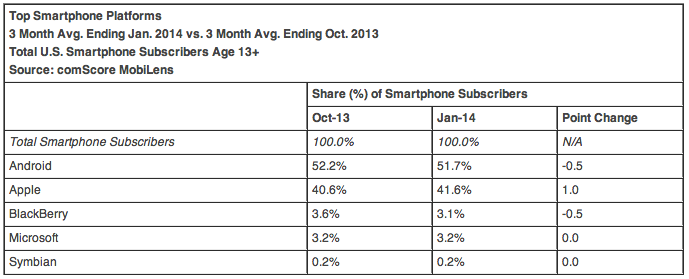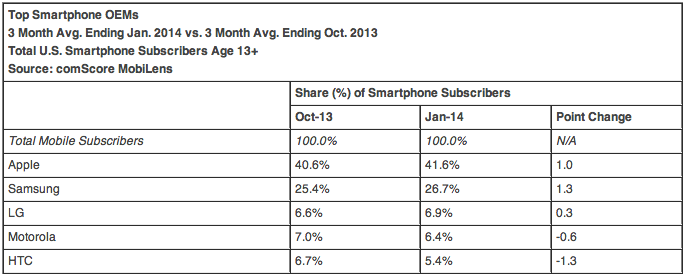
It's that time of the month once again, friends. Yep, it's time to check in with research firm comScore to see how each major mobile platform and device maker is doing in the U.S. smartphone market. It's been a few months since we last looked at these stats, so let's just dive right in and see where everyone stood at the end of Jan. 2014.
On the smartphone platform side, Android lost 0.5 percent market share during the three-month period between Oct. 2013 and Jan. 2014, but still managed to be kind of the handset hill with 51.7 percent of the market. iOS was the only platform to gain steam during the survey period, growing 1.0 percent to finish with a 41.6 percent share.
Things drop off sharply from there, with BlackBerry losing 0.5 percent share and ending up with 3.1 percent of the market. Meanwhile, Windows Phone held steady at 3.2 percent, which puts it ahead of BlackBerry at the end of Jan. 2014. Rounding out the top five is Symbian with a 0.2 percent share.
When we last checked out comScore's numbers in Dec. 2013, I noted that if BlackBerry continued to lose market share like it'd been doing, Microsoft could soon find itself in third place in the Great U.S. Smartphone Race. That's precisely what's happened in this latest report, and while Windows Phone didn't really take third place so much as BlackBerry lost it, I'm sure that Microsoft is just happy to have moved up a position. Considering that BlackBerry didn't release any new hardware in the final months of 2013 or early in 2014, don't be surprised if we see the company formerly known as RIM slip even further in next month's comScore report.

Moving on to the manufacturer side of things, we can see that Apple and Samsung are once again at the top of the heap with 41.6 percent and 26.7 percent market shares, respectively. LG saw a 0.3 percent gain during the survey period to finish with a 6.9 percent share. Then there's Motorola and HTC, which each lost some market share between October and January and ended up with shares of 6.4 percent and 5.4 percent.
The bottom three OEMs have shifted around a bit since last December. LG moved from fifth to third thanks to a combination of HTC losing market share, the launch of the Nexus 5 and wide availability of the G2. HTC has lost quite a few points of market share, likely due to the fact that the other top four OEMs had new flagship hardware out near the end of the year, while it stuck with the One. HTC's new flagship will likely be shown off later this month, and while leaks have shown it to be a pretty respectable Android handset, we''ll just have to wait and see if it's enough to turn things around for Peter Chou and Co.
Via comScore